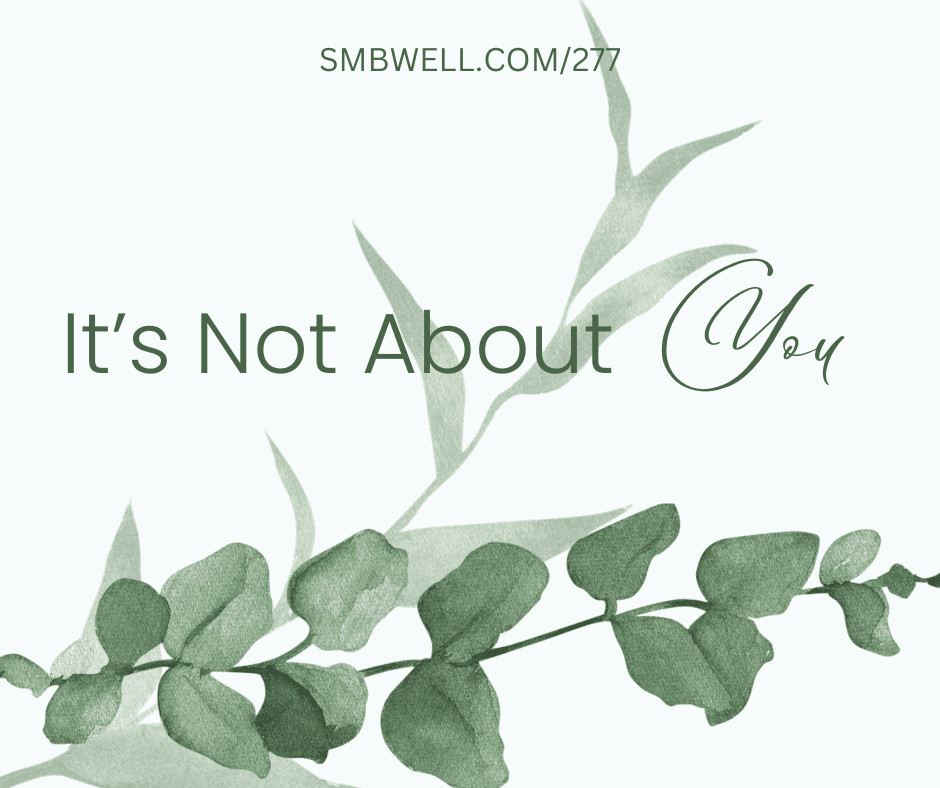Podcast: Play in new window | Download
Subscribe: Apple Podcasts | Spotify | Amazon Music | RSS | More
“It’s not about you.”
Our brains naturally focus on ourselves, but most things happening around us aren’t about us. To find peace and happiness, we need to change our perspective and let go of possessions.
Our brains have a natural inclination to make everything about ourselves, even when it’s not. We humans observe everything happening around us and interpret it in our own way. This means that everyone else is not part of our personal story. This self-centered perspective often leads us to take things personally and feel worse as a result.
To counter this tendency, I introduce the concept of alternative explanations. I am encouraging you my dear warriors to ask yourself:
- “What else might be going on?
- What’s another way of looking at this?”
To escape self-centeredness, we should question our first impressions and consider other viewpoints. When we can step back and see people’s behavior for what it is, it’s about them. It’s through their lens of perception and experience.
Heres a great example to see how the “alternative explanation” tool can come in handy. When we slowed this down and looked at what else might be going on, my client remembered that her friend daughter had big allergies. When we slowed it down and asked her brain what was an alternative explanation for why her friend had washed the clothes, she thought maybe she has a certain kind of detergent they like. When she slowed down and looked at tings from another angle, she felt such ease. When you change the way you look at things, the things you look at change. Just shifting a thought one degree can bring ease.
The concept of “it’s not about you”
I also wanted to highlight the importance of recognizing our triggers. If something triggers us, it’s a sign that it’s touching on an area of insecurity or self-doubt within ourselves. Take a breath, be nice to ourselves, and offer ourselves some compassion. Maybe say something like, ‘Hey, looks like you’re a little triggered. I think it’s probably because you’re feeling a little icky about your health choices lately. I get it. It’s okay.'”
It has profound implications for our emotional well-being and relationships. Recognizing that most of what happens around us has nothing to do with us, we can free ourselves from the burden of taking things personally. By changing how we see things, we can release anger, resentment, and self-doubt. Then, we can approach situations with more understanding and compassion.
When we stop making everything about ourselves, we open ourselves up to a world of possibilities. We become less reactive and more proactive in our interactions with others. We can choose to respond with kindness and empathy, rather than defensiveness or judgment. This not only improves our relationships but also enhances our own sense of self-worth and inner peace.
Recognizing our triggers and insecurities helps us grow and improve ourselves. When we become aware of the areas in which we feel most vulnerable, we can work on building our confidence and self-esteem. By addressing these underlying issues, we can become more resilient and less affected by external events or opinions.
In conclusion
The power of shifting our perspective to “it’s not about you” cannot be overstated. To find peace and happiness, we should realize that most things don’t involve us personally. We can question our first thoughts and adopt more uplifting beliefs by exploring ideas and reflecting on ourselves. Changing how we think can improve our relationships, emotional well-being, and personal growth.
As we move forward, let us embrace the concept of “it’s not about you” and apply it to our daily lives. Let us practice slowing down, breathing, and asking ourselves alternative explanations.
When triggers arise, use these reflection questions “which insecurity is this triggering in me?” Or “how’s this showing me an area of potential growth for me?”
Let’s be kind to ourselves and use them to grow and improve. By doing so, we can create a more harmonious and fulfilling life, both for ourselves and those around us.
Key Takeaways:
- Our brains have a tendency to make everything about us, even when it’s not.
- When we take things personally, we give our emotional freedom away.
- Slowing down and asking for alternative explanations can help us shift our perspective.
- If something triggers us, it’s about our own insecurities or self-doubt.
- Choosing better feeling thoughts and practicing self-compassion can bring more ease and peace.
Find support here:
⭐️ Find all links and resources mentioned in the show notes here
⭐️ See if the Love Your Life School is open for enrollment here
⭐️ Did you love this episode? Make sure you’ve listened to all the foundational episodes of the Love Your Life Show. Get the free Podcast Roadmap here
⭐️Do you get my weekly Wednesday email? I love connecting with warriors more personally through email.
⭐️Have you checked out my favorites on Amazon? I created some new lists: My favorite “Anxiety Helpers”, “Susie’s Supplements” and “Favorite Products”. Check them all out here (and then let me know what I should add to the lists! )
⭐️Are we friends on Instagram? Let’s catch up!
⭐️I’ve been sharing videos of my life in Australia on Facebook – I’d love to be friends with you there too!
⭐️For the price of a coffee, Support Susie and the Love Your Life Show
⭐️Have a child between the ages of 9-25? Learn the basics to support your changing child here





